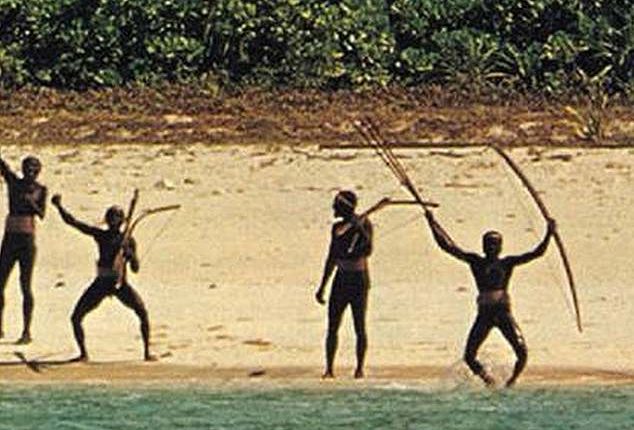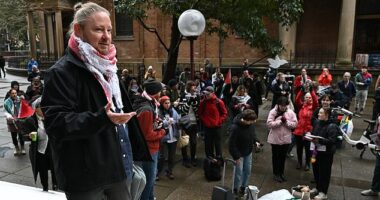In the vast expanse of the Bay of Bengal lies North Sentinel Island – a remote speck of land fiercely guarded not only by the Indian Navy, but also by its indigenous inhabitants, the Sentinelese.
This uncontacted tribe, the population of which is estimated to number between 50 and 200, has consistently shunned external contact and often responds with lethal force to intrusions.
To safeguard their isolation and protect them from contracting potential diseases from outsiders to which they have no immunity, the Indian government has imposed strict prohibitions on approaching the island.
Delhi has declared the island and its surrounding waters an exclusion zone enforced by Navy patrols, to which unauthorised entry is illegal and contact with the tribe is forbidden.
Violating these restrictions can have deadly consequences, as the Sentinelese are legally permitted to defend their territory – even to the point of killing trespassers.
Over the years, a number of outsiders – from hapless fishermen to a determined Christian missionary – have managed to gain access to the island, often meeting grisly endings once there.
Last Monday, an American tourist was arrested for allegedly travelling to a restricted reserve on North Sentinel Island and leaving behind a can of Coke as an ‘offering’ for the world’s most isolated tribe to try.
Experts, branding Mykhailo Viktorovych Polyakov’s attempted visit as ‘deeply disturbing’, warned that not only did he put himself in danger, but also put the entire Sentinelese tribe at risk of being wiped out were they to contract a common disease, such as measles or influenza.
The 24-year-old was seized by police when he returned to land – but this outcome may have been far kinder than the deadly consequences he could have faced had he had fallen into the hands of the dangerous tribe.

The Sentinelese, who are considered to be the world’s last pre-Neolithic tribe, have a history of hostility towards outsiders, having attacked almost everyone who has entered their territory

To safeguard their isolation and protect them from contracting potential diseases from outsiders to which they have no immunity, the Indian government has imposed strict prohibitions on approaching the island. Pictured: An Indian Naval vessel patrols the island

Violating the Indian government’s restrictions can have deadly consequences, as the Sentinelese are legally permitted to defend their territory – even to the point of killing trespassers. Pictured: North Sentinel Island’s Primrose shipwreck

Mykhailo Viktorovych Polyakov (pictured in Afghanistan last year) is a travel influencer who spent time with gun toting Taliban in Afghanistan. He was arrested on Monday after allegedly making an illegal landing on the remote island and leaving behind a can of Coke

John Allen Chau, 26, was killed in a hail of arrows as he went ashore on North Sentinel Island, off the coast of India, in 2018
The Sentinelese have a history of aggressively defending the territory – located in India’s Andaman and Nicobar archipelago – which they have inhabited for an estimated 30,000 to 38,000 years.
Anthropologists and explorers made successive attempts to establish friendly contact with the islanders throughout the 20th century.
While the islanders would often accept gifts brought for them by the visitors, they often welcomed visitors with a hail of arrows – forcing them to retreat.
In 1974, a National Geographic film crew’s expedition to the island produced a dramatic set of photographs of Sentinelese shooting arrows at the team, one of which became lodged in the director’s thigh as they retreated.
The article which accompanied the pictures characterised the islanders as a people for whom ‘arrows speak louder than words.’
In 2004, after surviving the Indian Ocean earthquake and its after-effects, including the tsunami and uplifting of the island, an Indian government helicopter observed several islanders to ensure their safety.
Responding to the help, tribe members were chillingly photographed shooting arrows, throwing spears and launching stones at the choppers to deter them.
In 2006, two Indian fishermen whose boat inadvertently drifted into their waters were killed by the island warriors.
According to witnesses on a nearby fishing boat, the two men were brutally hacked to death with axes.
A few days after the killings, their bodies were reportedly hooked up on bamboo sticks like ‘a kind of scarecrow’, according to an Indian police chief who shared details of the incident.

Pictured: An Indian Navy boat patrols in the waters of the Andaman Sea near Port Blair, the capital of India’s Andaman and Nicobar islands, March 16, 2014

The Sentinelese attracted international attention in the wake of the 2004 Asian tsunami, when a member of the tribe was photographed on a beach, firing arrows at a helicopter that was checking on their welfare

Polyakov, 24, was arrested in India’s Andaman and Nicobar Islands on Monday after he allegedly visited a prohibited tribal reserve on North Sentinel Island without authorisation

He left behind ‘offerings for the Sentinelese’ tribe (pictured in a file photo)
They were buried in shallow graves on the beach and authorities’ attempts to retrieve their bodies proved futile.
More recently, in 2018, American missionary John Allen Chau was killed when he illegally attempted to make contact with the tribe.
Chau attempted to convert the tribe members to Christianity but was shot to death in a barrage of arrows as he went ashore.
His body remains on the island despite multiple attempts by Indian authorities to retrieve it.
He had repeatedly tried to reach out to the tribe in a bid to talk to them about Christianity – a move which his friend said ‘he knew that he had no business doing.’
Chau hired a group of fishermen to take him there on a boat which also towed his kayak, making his first attempt to reach the island on November 15, 2018.
The missionary paddled toward the shore in his kayak and sent the boat with the fishermen back out to sea in a bid to avoid detection.
Chau’s own journal entries – dated between November 14 to 16 – shed some light on what occurred when he first approached the island.
The adventurer said he came face to face with the islanders and at one point was ‘just inches’ away.
‘They had two arrows each, unstrung, until they got closer. I hollered, ‘My name is John, I love you and Jesus loves you,” he wrote.
‘I regret I began to panic slightly as I saw them string arrows in their bows. I picked up the fish and threw it toward them. They kept coming.
‘I paddled like I never have in my life back to the boat. I felt some fear but mainly was disappointed. They didn’t accept me right away.’
But he was undeterred and just a few hours later returned – this time attempting to walk to the beach to deliver gifts such as a football and fish to the tribespeople.
Chau was once again met with hostility and was chased back into the surf before he frantically swam toward the fishermen who had been waiting for him.
He later wrote of the incident that he had been shot at by a child aged around 10, with his Bible taking the brunt of the arrow.
Despite the close brush with death, Chau was undeterred by the group’s anger and returned twice more.
He was again met with hostility and the final attempt would prove to be fatal as he was struck down in a hail of arrows.
The fisherman who had been aiding the Christian missionary said that they had watched in horror from a distance as the tribesmen dragged his body away with a rope around his neck.

American missionary John Chau, 26, (pictured) was killed in a hail of arrows as he went ashore on North Sentinel Island in November 2018 in an attempt to convert tribe members to Christianity
Speaking after Chau’s death, anthropologist T N Pandit, who led a number of ‘friendly contact’ expeditions to the island, said that the first instincts of the Sentinelese was not to kill.
‘They are not hostile people. They warn; they don’t kill people, including outsiders,’ he said.
‘They only say, ‘Leave us alone.’ They make it amply clear that outsiders are not welcome in their habitat. One needs to understand that language.’
Despite these well-documented dangers, some individuals, to this day, attempt to breach the island’s isolation.
YouTuber Polyakov made it off the island with his life, and it is so far not known whether he came up against any resistance from the islanders.
His journey began on March 26. Equipped with an inflatable boat, GPS, and a camera, he arrived in Port Blair and sailed across a 25-mile straight from Kurma Dera Beach to North Sentinel Island on a makeshift craft.
Upon reaching the island three days later, he tried to attract the Sentinelese by blowing a whistle and left behind a can of Coke and a coconut as offerings.
He also collected sand samples and filmed his actions while on the island for around five minutes before returning.
Local fishermen reported his activities, leading to his arrest. He now faces up to five years in jail.
Caroline Pearce, the director of indigenous rights group Survival International, branded Polyakov’s attempt to visit the island as ‘reckless and idiotic’.

Chau, who was born in Alabama but grew up in Vancouver, Washington, had two overarching passions – outdoor activity and Jesus Christ
‘This person’s actions not only endangered his own life, they put the lives of the entire Sentinelese tribe at risk,’ she said in a statement provided to MailOnline.
‘It’s very well known by now that uncontacted peoples have no immunity to common outside diseases like flu or measles, which could completely wipe them out.
‘The Indian authorities have a legal responsibility to ensure that the Sentinelese are safe from missionaries, social media influencers, people fishing illegally in their waters and anyone else who may try to make contact with them.’
Recognising the Sentinelese’s desire for seclusion, the Indian government has declared the island and its surrounding waters extending five nautical miles (9 kilometers) as an exclusion zone under the Andaman and Nicobar Islands Protection of Aboriginal Tribes Act, 1956.
This means unauthorised entry is illegal and contact with the tribe is forbidden.
The measure aims to prevent outsiders from disturbing the tribe and to shield them from diseases against which they have no immunity.
The area is patrolled by the Indian Navy to enforce this isolation.
INS Cora Divh, INS Cheriyam, INS Saryu, and INS Sumedha are believed to be the Indian Naval ships which most typically patrol the Andaman and Nicobar islands.
All of them share the same homeport – Port Blair – the capital city of Andaman and Nicobar Islands.
Unlike the other Andaman Islands, which have seen tourism and development, North Sentinel remains untouched by modern civilisation.
It is home to dense forests, unspoiled beaches, and a pristine ecosystem.
The Sentinelese’s isolation is not just a matter of preserving their culture and habitat but also of survival.
Their lack of exposure to common sicknesses means that contact with outsiders could introduce diseases capable of decimating their population.
This is why the Indian government remains steadfast in its commitment to enforcing the exclusion zone, with the Indian Navy conducting regular patrols to deter potential intruders.
While the allure of contacting one of the world’s last uncontacted tribes may tempt adventurers and influencers, the risks – both the Sentinelese and the intruders – are far too great.
The Indian authorities continue to emphasise the importance of respecting these boundaries, ensuring that the Sentinelese can maintain their way of life undisturbed.







